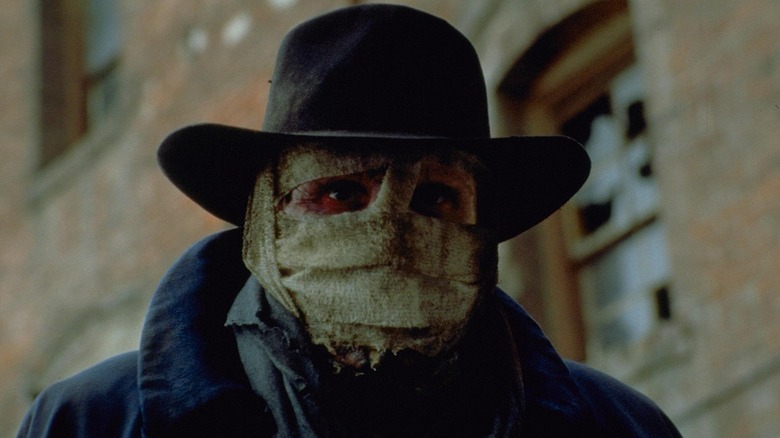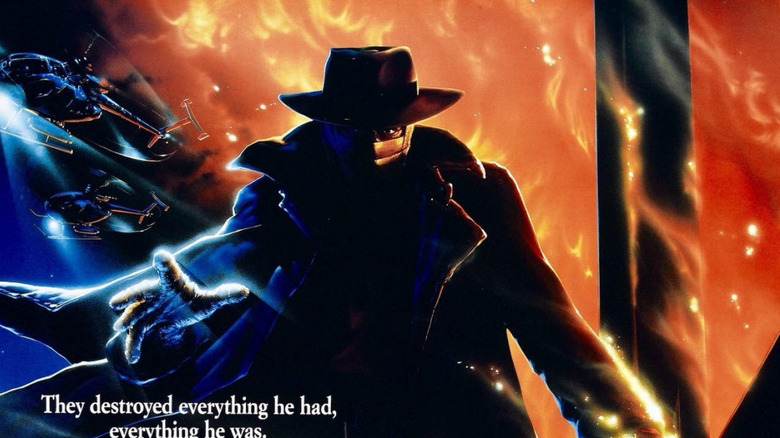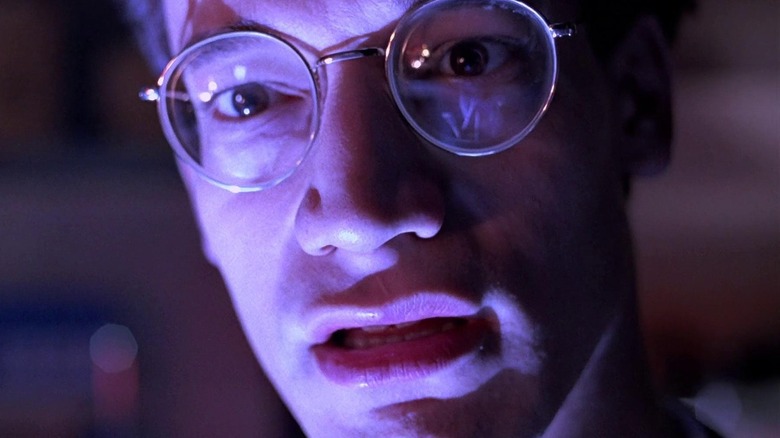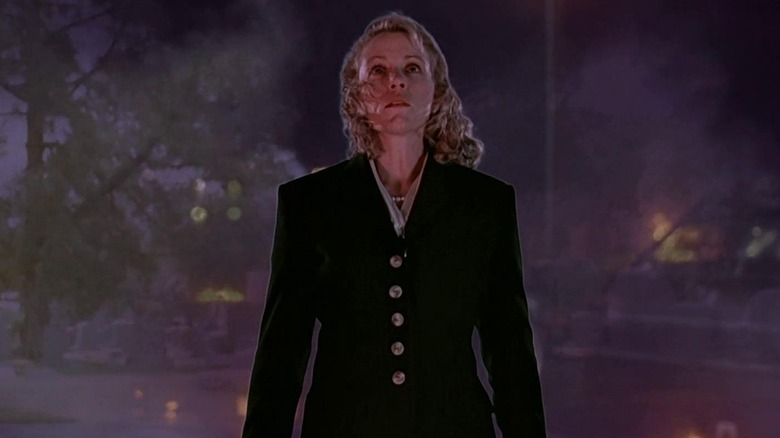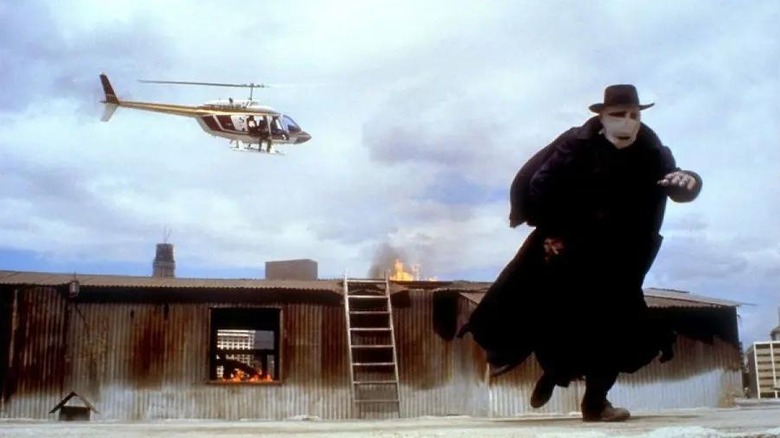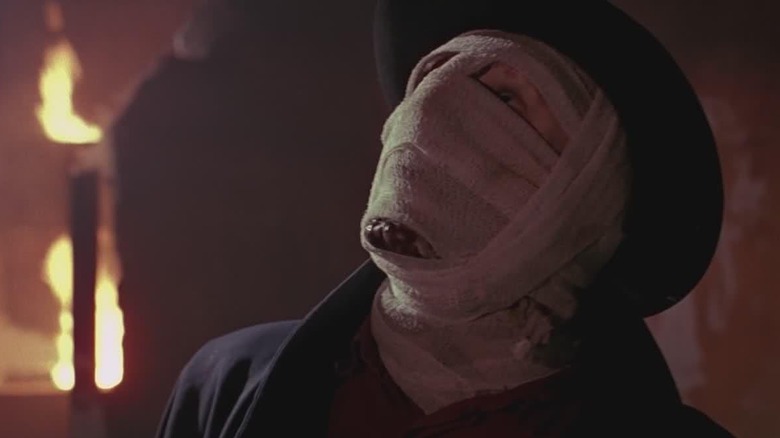Years Before Spider-Man, Sam Raimi's First Superhero Movie Was A Surprise Box Office Hit
We may receive a commission on purchases made from links.
(Welcome to Tales from the Box Office, our column that examines box office miracles, disasters, and everything in between, as well as what we can learn from them.)
"Sam introduced me to Liam Neeson, and I told him how excited I was to be working at Universal on a horror movie. And he just looked at me and said, 'This is not a horror movie.'" Those are the words of former Universal head of creative advertising David Sameth, speaking with The Hollywood Reporter in 2020. The Sam in question was Sam Raimi, director of "The Evil Dead," and the movie in question was "Darkman."
Neeson was right. While Raimi's unconventional, dark, gritty superhero movie does have some horrific elements, nobody could accuse it of being a horror movie. But the exchange illustrates the struggles that went on behind the scenes when it came to Raimi's vision and what Universal Pictures wanted to turn that vision into. In the end, years before Raimi would break records with his box office smash "Spider-Man," he turned an original hero into a surprise hit.
In this week's Tales from the Box Office, we're looking back at "Darkman" in honor of its 35th anniversary. We'll go over how it came to be, why the movie seemed doomed to fail, what happened when it hit theaters, what happened in the aftermath of its release, and what we can learn from it all these years later. Let's dig in, shall we?
The movie: Darkman
The film, as we know it, centers on Dr. Peyton Westlake (Neeson), who is on the verge of a major breakthrough in creating synthetic skin. Unfortunately, his lab is blown up by gangsters, leaving him burned beyond recognition and changed by his experimental medical procedure. Westlake then takes up the mantle of Darkman on a quest for revenge, hoping for a new life with his former love, Julie (Frances McDormand).
"I've always loved comic books, and at the time I was trying to get the rights to 'The Shadow,' Raimi said in a 2007 interview with Collider. "I thought I'll make my own Shadow then. I'll call it 'Darkman,' which is just an obvious Shadow ripoff. [Laughs]."
Universal had been developing a cinematic take on Walter B. Gibson's pulp hero. That eventually materialized in the form of the 1994 flop "The Shadow," starring Alec Baldwin in the lead role. The studio wouldn't give Raimi a crack at it, so he decided to create his own riff on something similar. Only through Raimi's filter, the story proved to be much darker. Ultimately, Universal got on board with this original, dark, bizarre concept.
It's important to remember the landscape at this time. Superheroes were far from a safe bet in this era. Marvel had yet to earn big-screen success of any kind. Tim Burton's "Batman" became a massive hit in 1989, which gave Hollywood some inkling to pursue comic book stories. Hence, Universal bought Raimi's pitch.
Darkman was a superhero who was hard to classify
The story Raimi cooked up borrowed not only from "The Shadow," but the Universal Monsters, "The Hunchback of Notre Dame," and even "Batman." Rami was, at that point, pretty much exclusively known for the "Evil Dead" pictures, as his other feature, "Crimewave," was far from a hit, to say the least. Superheroes tended to be, well, heroic. Glitzy. Though not a horror movie, "Darkman" was hard to categorize, as Raimi envisioned it.
"Darkman is not really a horror picture," Raimi said, speaking to Fangoria in 1990. "It's more of a tragedy than anything else. Sure, he looks terrible, he looks hideous, he's an ugly son of a b***h. But really, what the movie turns out to be is the story of a man trying to recapture his lost love." Raimi also explained in that interview how the story evolved. As he said:
"It was originally a short story I wrote, then a 40-page treatment. It became a story of a man who lost his face and had to take other faces. Then it became a story of a man who battled criminals using this power. And then because he lost his face, the idea of what would happen if he'd had a relationship before became important."
While Universal committed between $8 and $12 million for the movie's budget, they weren't content with Raimi's story alone. Many, many drafts of the screenplay ensued, with numerous writers, including his brother Ivan Raimi and Chuck Pfarrer taking cracks at it.
Things got dark behind the scenes of Darkman
"There are 5,000 names on that script. It was constantly being rewritten. In hindsight, I am not sure it ever got better," producer Rob Tapert, one of Raimi's frequent collaborators, said in that same 2020 The Hollywood Reporter piece. "The Coen brothers were not credited by the guild, but they were instrumental early on with building the structure. The idea sprung from Sam's head, and Joel and Ethan coaxed him along that road."
Indeed, "No Country for Old Men" and "Fargo" directors, the Coen Brothers, had a hand in the script. It became a too-many-cooks-in-the-kitchen situation. Even so, Universal took it very seriously, getting an up-and-coming Neeson in the lead role, with McDormand beating out Julia Roberts for the role of Julia. The movie that the studio wanted versus the movie Raimi wanted, once all of the footage was in the can, became a huge source of contention. There were numerous battles in the editing room, with test screening scores scaring Universal. As Tapert further explained to THR:
"Universal sent us away. We came back, and the editor had cut it down from two hours to 85 minutes. We tested that, and it did not test as well as the longer version, which was Sam's cut. I think we went through four or five more test screenings, and each time the score got lower and lower, and we got more depressed."
After bringing in editor Bud S. Smith and locking an edit Raimi wasn't happy with, they ended up re-editing the film without Universal knowing. They didn't want a movie that looked like "Evil Dead." They didn't know if they were making a love story, a horror movie, or a superhero movie. In the end, it was some combination of the three.
The financial journey
Marketing was naturally a challenge for Universal. Not only were there debates about what movie they were trying to sell, but there was no mainstream superhero marketing playbook at this time. We were still a decade away from "X-Men" bringing Marvel to the mainstream. Still, between a marketing campaign that boasted the incredible tagline, "Who is Darkman?" and a perfect, fortuitous release date, everything fell into place.
"Darkman" hit theaters on the weekend of August 24, 1990. In part due to a lack of strong competition and in part because the film Raimi and Tapert sneakily re-edited resonated with critics at the time, Universal found itself with a totally unexpected number one movie. Raimi's biggest directorial effort to date opened atop the charts with $8 million. Its biggest competition was "Ghost," which was already nearly two months into its phenomenal run. With "The Witches" opening to a soft $2.2 million and "Men at Work" arriving with just $3.1 million, the coast was clear.
It was a different time, and because the following weekend was also light, the film dropped just 1% the following weekend. It was a certified hit, especially in light of its reasonable budget. It cost far less than any modern superhero movie, and because of that, Universal's concerns naturally evaporated.
"Darkman" finished its run with $33.8 million domestically to go with an estimated $15 million overseas for a grand total of $48.8 million worldwide. Even though it wasn't necessarily a good experience for the director, it was Raimi's biggest hit to date. It also birthed a full-on franchise.
Darkman spawned an unexpected superhero franchise
Not only did Raimi's original superhero endeavor perform in theaters, but this was at the peak of the home video market. It performed on VHS, made its way to DVD, and even got a 4K Ultra HD release from Scream Factory in 2024. It's had a surprisingly robust life in the years since its initial release. While no precise figures are available, Universal has undoubtedly made money over the last three decades and change from this entry in the library.
The success led to two sequels, which were released direct-to-video: 1995's "Darkman II: The Return of Durant" and 1996's "Darkman III: Die Darkman Die." Bradford May took over the director's chair, with Raimi serving as an executive producer. But that's just the tip of the iceberg. There was a short-lived Marvel Comics series, several novels, a video game, and even a pilot for a failed TV series. It's a surprisingly robust franchise, even if it doesn't consistently get the credit.
Speaking of being robust and enduring, Raimi confirmed in 2022 that Universal was planning another new "Darkman" movie. "I haven't heard the story yet or gone into it," he said at the time while adding, "But I think it's cool." Even so, the fact that we're still talking about this movie 35 years later, with a possible reboot on the table, speaks volumes.
Raimi would go on to direct three "Spider-Man" movies, creating a defining multi-billion-dollar franchise. He later returned to the superhero realm in 2022 to direct "Doctor Strange in the Multiverse of Madness," one of Marvel Studios' biggest hits of the quarantine era of the pandemic.
The lessons contained within
Years before any of that, he brought this original concept to the genre at a time when it was anything but a sure bet. There's truly something to be said for that. Even over the last 15 years, when superheroes have largely propped up the box office and been the envy of Hollywood, anything outside of established heroes created by Marvel and DC has been hard to come by. The rare attempts rarely work, with Vin Diesel's "Bloodshot" serving as an example of a swing and a miss. Then there's the development hell of Blumhouse's yet-to-be-made "Spawn" reboot.
Credit to Universel for being willing to commit to the original idea, even if they got cold feet about it during the edit. It stands out like a sore thumb that the unsanctioned edit may well have saved the movie commercially. More than any of that, though, this all came about because Raimi loved "The Shadow" but couldn't make "The Shadow." Rather than accept defeat, he let the creative juices flow and made his own thing.
It calls to mind Steven Spielberg making "Raiders of the Lost Ark" because he couldn't make a "James Bond" movie. In an era when Hollywood studios still seem foolishly married to recognizable IP above all else, these stories take on new meaning. With the right budgets and the right filmmakers, allowing more original ideas to thrive is the only way new franchises can happen. For new heroes to rise.
